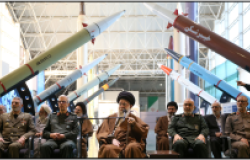The Islamic State’s Je Ne Sais Quoi
"To stay even in this war against the Islamic State (an entity which combines 8th century Islamist practices, values, and ideology with 21st century technology) — let alone winning it — seems a stretch. And here’s why," writes Aaron David Miller.

In case you missed it, you should spend a few minutes watching former Amb. Alberto Fernandez’s June 10 interview with CBS’s Margaret Brennan. Fernandez, as you may recall, was appointed coordinator of the Center for Strategic Counterterrorism Communications by President Barack Obama’s administration in 2012. The CSCC was created in 2010 in order to “coordinate, orient, and inform government-wide public communications activities directed at audiences abroad and targeted against violent extremists and terrorist organizations, especially [al Qaeda], its affiliates, and its adherents.”
Fernandez retired from the State Department in April and has since been replaced by Rashad Hussain, formerly the U.S. special envoy to the Organization of Islamic Cooperation. In addition to Fernandez’s old job at the State Department, Hussain will have a much bigger title: United States special envoy and coordinator for strategic counterterrorism communications. And, according to the press release, he will “lead a staff drawn from a number of U.S. departments and agencies to expand international engagement and partnerships to counter violent extremism and to develop strategic counterterrorism communications around the world.”
Why Fernandez left is not entirely clear. Maybe it was just time to retire. But he’s also a career foreign service officer with a long history of putting on his talking-truth-to-power hat. In 2006, he opined during an interview that the United States had displayed “arrogance and stupidity” in Iraq, comments that were quickly corrected by a senior administration official who made clear they didn’t reflect “our policy.” (Fernandez later issued what the Guardian called “a terse” apology.)
As is the case with most of these “why he’s really leaving the State Department” stories, there’s usually (always?) another side, and somewhere lurking along the periphery of these stories are turf battles and personality conflicts. Clearly, the social media strategy against the Islamic State wasn’t working. It’s never good when an anti-Islamic State video is mocked on national media; this one got dressed down by John Oliver. And maybe the White House was looking to shake things up and consolidate control of the social media effort across the government. Among other jobs, Hussain was formerly a deputy associate legal counsel to the president and worked at the National Security Council.
Based on Fernandez’s exit interview with CBS News, the government has its work cut out for it. Fernandez sliced and diced with economy and some humor to boot. “It’s not that ISIS is so great,” he told Brennan, using an acronym for the Islamic State. “It is that the response … is both limited and weak.” “There is a fantasy which exists in Washington,” he went on to say. That if somehow “you put magic social media or public diplomacy pixie dust on a problem, it will go away.”
My favorite line in the Fernandez interview was his response to Brennan’s question about whether the Obama administration was pursuing a policy of “benign neglect” toward the Islamic State, presumably that it had been slow to understand its rise and even slower to respond. Fernandez’s rebuttal was short and not sweet: It was a policy of “malign neglect.”
So will the changes in personnel and process improve U.S. efforts to counter the Islamic State’s social media? A recent internal review written by the State Department’s Richard Stengel, undersecretary of state for public affairs, was searing in its criticism of the U.S. effort. In reviewing Stengel’s memo, theNew York Times reported that the assessment’s takeaway was “that the Islamic State’s violent narrative — promulgated through thousands of messages each day — has effectively ‘trumped’ the efforts of some of the world’s richest and most technologically advanced nations.”
Stengel doesn’t seem like a “fold up the tents and let’s go home” kind of guy. In February, he told the New York Times that the Islamic State isn’t “BuzzFeed; they’re not invincible in social media.” And no doubt a shake-them-up assessment was long overdue.
Indeed, maybe a more coordinated and integrated approach that involves U.S. embassies, the Pentagon, and U.S. regional allies really will help to increase the quantity and better quality to the messaging against Islamic State forces in the region. I’m certainly no tech guy or authority on social media. I’m still using a flip-phone.
But to stay even in this war against the Islamic State (an entity which combines 8th century Islamist practices, values, and ideology with 21st century technology) — let alone winning it — seems a stretch. And here’s why.
It’s success, stupid
The most important ideology in life isn’t nationalism, capitalism, or even democracy. It’s success. Because winning brings with it power, street cred, and recruits. The Islamic State isn’t al Qaeda hiding in the shadows planning discrete terrorist attacks, it’s something else: a growing multifaceted political, economic, social, military, and terrorist entity that dominates real estate and cyberspace as it seeks opportunistically — like some hostile microbes — new homes and hosts.
Beating the Islamic State requires demonstrating that its expansion has reached a natural limit. In his seminal piece for theAtlantic, “What ISIS Really Wants,” Graeme Wood argues that “properly contained, the Islamic State is likely to be its own undoing.”
But that means checking its expansion mainly in Iraq, so that the Syrian caliphate is contained, and then finding a way to ensure it can’t deliver the autonomy, freedom, and hope that it promises its recruits. The Islamic State must be made ordinary — just another failed effort to deliver on its promises. Short of demonstrating the failure of the mother ship or convincing Turkey to seal its border with Syria, it’s hard to see how you could stop the 1,000 recruits the Islamic State is reportedly signing up each month.
What’s the counter-narrative?
As Fernandez points out in his interview, the Islamic State may be a psychopathic organization, but that doesn’t mean that the vast majority of recruits attracted to it are. It’s not cynicism, disillusion, and dystopia that the Islamic State is trying to sell, but rather hope and identity, as well as personal and religious fulfillment. And this is why its way of garnering supporters is so effective. In fact, those who join the ranks of the Islamic State “are trying to find a path, to answer a call to something, to right some perceived wrong, [or] to do something truly meaningful with their lives,” John Horgan, director of the Center for Terrorism and Security Studies at the University of Massachusetts Lowell, told the Atlantic’s Simon Cottee. And the fact is for all its clever negative messaging to combat the Islamic State’s propaganda, the United States lacks an effective counter-narrative — indeed it lacks a narrative that even begins to compete with the emotional resonance and power of either the online savage theater of choreographed beheadings or the more uplifting appeal of “come and be part of a community that will give you purpose and direction.”
Hearts and minds? Or minds and hearts?
I’ve always wondered about this. What comes first in the counter-narrative and counterterrorism campaigns that democratic states launch against extremist ones?
The conventional sequence is the former: Hearts first. In this attempt, you appeal to someone’s emotions by selling something compelling often on the values side — as a way of capturing their loyalties and affection, and then presumably you will persuade them that your interests are theirs. This has been the way that U.S. public diplomacy has been oriented long before there was an Islamic State: selling U.S. values, American jazz, sports, and, of course, freedom and individual choice. In this regard, the U.S. government has long tried to convince Arabs and Muslims that the United States is not at war with Islam and has showcased the success of Muslims in America. The State Department, in particular, has long tried to advertise this success. A glossy State Department publication published in 2009 is a prime example of that approach with compelling photos highlighting how wonderful life is for Muslims in America.
The problem with much of the earlier outreach in the Middle East and Muslim world is that it’s hard to persuade folks by just changing the wrapping paper on the box if the contents of that box, in this case U.S. policies that alienate Arabs and Muslims, remain essentially the same. The fact is the Islamic State’s campaign is aimed at both hearts and minds.
The Islamic State appeals to the alienated and aggrieved not just by luring them into positive identification with a community, but also by portraying a Sunni world (the “real” Islam) as under siege by an alliance of Shiite, Sunni betrayers, and foreign “Kaffirs.” And U.S. policy — support for Saudi Arabia, an Iranian nuclear deal, and its cooperation with Iraqi Shiite militias killing Sunnis, and leaving the Assad regime in power — fits that conspiracy and impels recruits to join and “save” Islam, not just because it appeals emotionally but because it appears to be in their own self-interest too, a project in the real world with which disaffected Sunnis can rally around.
Railing on the Islamic State in an effort to show its brutality, hypocrisy, and publicizing its atrocities against Sunnis seems, on balance, the right kind of message. (I’d recommend this smart piece in Time by Jessica Stern and J.M. Berger for their 6-point plan on how to do this, which includes halting the exaggeration of the Islamic State’s invincibility and the romanticizing of Islamic State wives and defectors, while publicizing the atrocities the Islamic State has committed against Sunnis. But even that’s not going to answer the mail.)
As important as the war of narratives may be, the fight against the Islamic State will not be won or lost in cyberspace. Rather the winner of this fight will ultimately be determined by how much will and skill the United States (and its allies) is prepared to bring to the battle on the very ground where the Islamic State now prospers. It’s changing that reality that holds the key to any kind of success.
Which is a point the outgoing Fernandez made in a March interview with the Atlantic. “Messaging can shape and shade,” he said, “but it can’t turn black into white.”
The opinions expressed here are solely those of the author.
This article was originally published on ForeignPolicy.com.
About the Author


Middle East Program
The Wilson Center’s Middle East Program serves as a crucial resource for the policymaking community and beyond, providing analyses and research that helps inform US foreign policymaking, stimulates public debate, and expands knowledge about issues in the wider Middle East and North Africa (MENA) region. Read more










